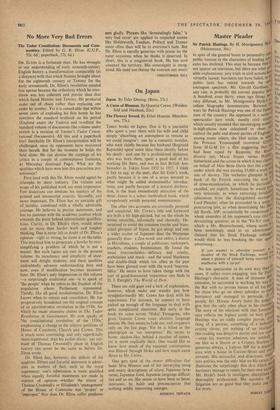On Japan
Japan. By Ester Dening. (Benn, 27s.)
THREE books on Japan. One is by a journalist who spent a year there with his wife and child simply 'absorbing an atmosphere as remote as we could imagine': one by a romantic novelist, who went chiefly because her husband (Reginald Reynolds) spent some time there shortly before his death: and one by a professional diplomat, who was born there, spent a good deal of his working life there, and was in fact British Am- bassador in Tokyo from 1952 to 1957. I think it fair to say, at the start, that Sir Esler's book, partly because it is one of a series devoted to what might be called statesmanlike introduc- tions, and partly because of a natural delibera- tion, is the least immediately attractive of the three. Japan is a sober, methodical book, which scrupulously avoids personal reminiscences.
The other two accounts are avowedly personal and anecdotal. Mr. Crewe's title and foreword are both a bit high-pitched, but on the whole he writes smoothly, informally and shrewdly. De- termined to avoid the common tourist and State- aided glimpses of Japan, he got aboyt and met a wider scatter of Japanese than the Westerner generally does: a Zen monk and abbot, a doctor in Hiroshima, a couple of politicians, innkeepers, teachers, students, businessmen. He found the usual irreconcilables—delicacy and cruelty, xstheticism and muck--and the usual blankness and double-think which too often in the past have been glossed over with the word 'inscruta- bility.' He seems to have taken things with the sort of good-humoured impatience one finds in D. J. Enright's The World of Dew.
There are odd gaps and a lack of explanation, however, which make one wonder just how straightforwardly Mr. Crewe has dealt with his experiences. For instance, he appears to have picked up enough of the language to deal with quite complicated situations. But early in the book we come across `Mokte Yanagawa, who gives Quentin Crewe some abortive language lessons. He then seems to fade out, and reappears only on the last page. Yet he is billed in the photograph as 'our interpreter.' He seems to hover, shadow-like, behind a number of. scenes, yet is never explicitly there. One would like to know how much of the reported conversation was filtered through Moku and how much came direct to Mr. Crewe.
One gets tired of the minor difficulties that beset Miss Mannin and of her unvarying smug and weary descriptions of ofuro, Japanese lava- tories. Japanese food, Japanese language difficul- ties and so on. She seems to have been so beset, moreover, by habit and preconception that nothing wildly interesting emerges.
ANTHONY THWAITE


































 Previous page
Previous page